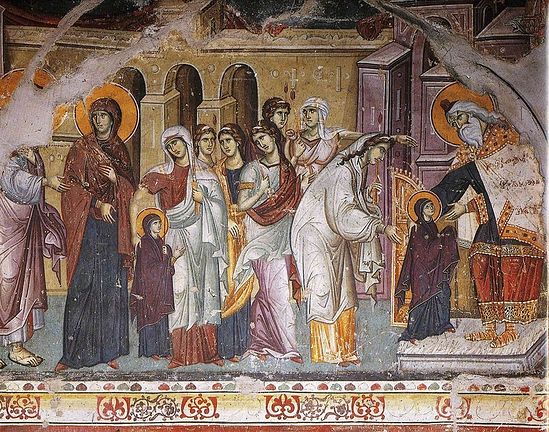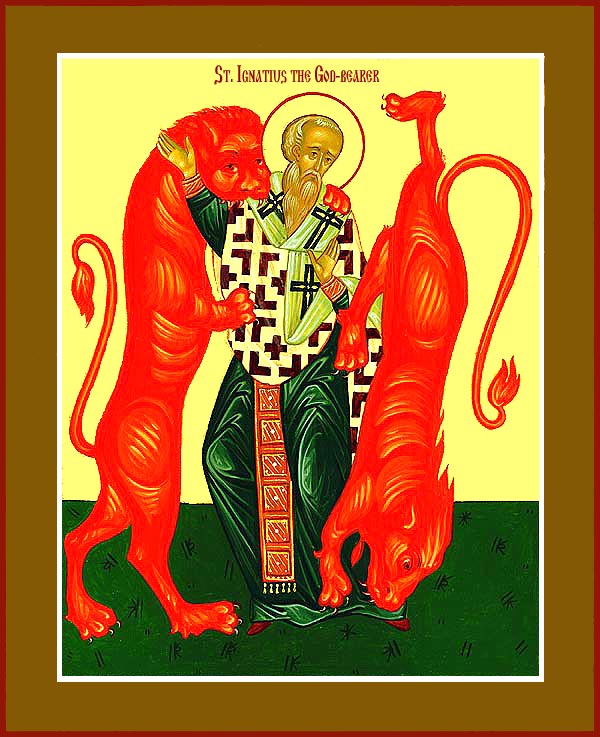 Hearken, O daughter, and see, and incline thine ear; and forget thine own people and thy father’s house. And the King shall greatly desire thy beauty,1 for He Himself is thy Lord, and thou shalt worship Him.
Hearken, O daughter, and see, and incline thine ear; and forget thine own people and thy father’s house. And the King shall greatly desire thy beauty,1 for He Himself is thy Lord, and thou shalt worship Him.
Ps. XLIV: 9-10
God is wondrous in His ways, for in order to make blessed the being that comes from Him with a most exalted and incomprehensible blessedness, He from the ages deigned to unite His own nature with the nature of man, in the Person of His Only-Begotten Son—thus through Him to extend this union also to the fullness of the Church, which, according to the law of incarnation, is His body, and in this manner dissolving and as if mutually leveling all divinity with all lowly things, That in the dispensation of the fullness of times (Eph. 1:10), as the apostle says, When all things shall be subdued unto him, then shall the Son also himself be subject unto him that put all things under him, that God may be all in all (1 Cor. 15:28). This great resolution of the eternal counsel, or, according to the Apostle, this mystery, although it hath been hid from ages and from generations, is now made manifest also to his saints (Col. 1:26); and the Holy Spirit nevertheless revealed even this very revelation, which bears seven seals, to His mystics, and through them to all humankind to the extent of its gradually growing understanding obligating it to match up to and facilitate its fulfillment. Thus did one of the Prophets, who saw mankind in the past days of its infancy and under the guardianship of the law growing to the fullness of its years, when it was obligated to become capable of its task of being betrothed to Divinity and giving birth to a timeless Child, portrays the Son of God as the King approaching the wedding. And taking upon himself the role of the bringer of the bride, or friend of the bridegroom, the Prophet as if impatiently convinces human nature not to further postpone this blessed union by betrayal and insubordination, but to commit itself to it through sincerity and faithfulness. Hearken, O daughter, and see, and incline thine ear; and forget thine own people and thy father’s house. And the King shall greatly desire thy beauty
Long did this Divine voice call in the Church as in the desert, and apparently did not find a hearkening ear. Humankind did not have the boldness to triumphantly go forth to meet the Divinity. What would have happened to us had the heart of the blessed Virgin Mary not opened to the incomprehensible word of the incarnation, had her boundless dedication to God’s will not responded to the heavenly messenger,2 Behold the handmaiden of the Lord: be it unto me according to Thy will (Lk. 1:38)? She entrusted herself to the King’s desire without holding anything back—and the betrothal of the Divinity with the human race was fulfilled forever.

 The Hieromartyr Ignatius the God-Bearer, was a disciple of the holy Apostle and Evangelist John the Theologian, as was also Saint Polycarp, Bishop of Smyrna (February 23). Saint Ignatius was the second bishop of Antioch, and successor to Bishop Euodius, Apostle of the Seventy (September 7).
The Hieromartyr Ignatius the God-Bearer, was a disciple of the holy Apostle and Evangelist John the Theologian, as was also Saint Polycarp, Bishop of Smyrna (February 23). Saint Ignatius was the second bishop of Antioch, and successor to Bishop Euodius, Apostle of the Seventy (September 7).
 The Holy Great Martyr Barbara lived and suffered during the reign of the emperor Maximian (305-311). Her father, the pagan Dioscorus, was a rich and illustrious man in the Syrian city of Heliopolis. After the death of his wife, he devoted himself to his only daughter.
The Holy Great Martyr Barbara lived and suffered during the reign of the emperor Maximian (305-311). Her father, the pagan Dioscorus, was a rich and illustrious man in the Syrian city of Heliopolis. After the death of his wife, he devoted himself to his only daughter. The Holy Prophet Habakkuk, the eighth of the Twelve Minor Prophets, was descended from the Tribe of Simeon, and he prophesied around 650 B.C.
The Holy Prophet Habakkuk, the eighth of the Twelve Minor Prophets, was descended from the Tribe of Simeon, and he prophesied around 650 B.C. Saint John Chrysostom, Archbishop of Constantinople, one of the Three Hierarchs [January 30], was born at Antioch in about the year 347 into the family of a military commander. His father, Secundus, died soon after the birth of his son. His mother, Anthusa, widowed at twenty years of age, did not seek to remarry but rather devoted all her efforts to the raising of her son in Christian piety. The youth studied under the finest philosophers and rhetoricians. But, scorning the vain disciplines of pagan knowledge, the future hierarch turned himself to the profound study of Holy Scripture and prayerful contemplation. Saint Meletius, Bishop of Antioch (February 12), loved John like a son, guided him in the Faith, and in the year 367 baptized him.
Saint John Chrysostom, Archbishop of Constantinople, one of the Three Hierarchs [January 30], was born at Antioch in about the year 347 into the family of a military commander. His father, Secundus, died soon after the birth of his son. His mother, Anthusa, widowed at twenty years of age, did not seek to remarry but rather devoted all her efforts to the raising of her son in Christian piety. The youth studied under the finest philosophers and rhetoricians. But, scorning the vain disciplines of pagan knowledge, the future hierarch turned himself to the profound study of Holy Scripture and prayerful contemplation. Saint Meletius, Bishop of Antioch (February 12), loved John like a son, guided him in the Faith, and in the year 367 baptized him.